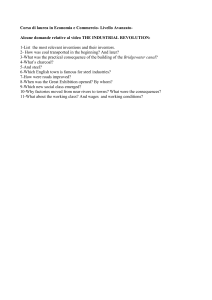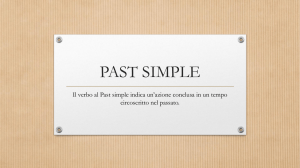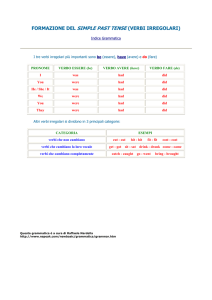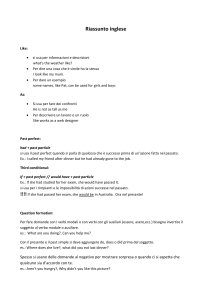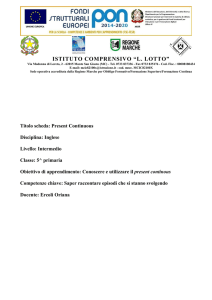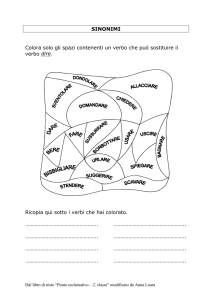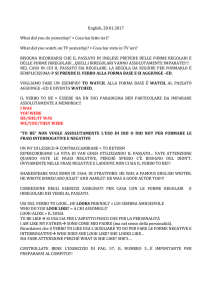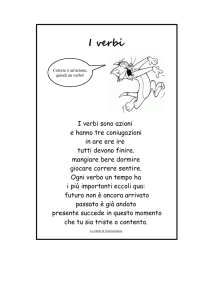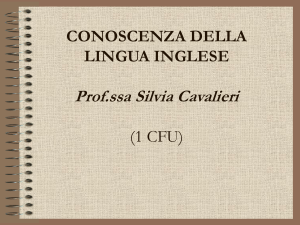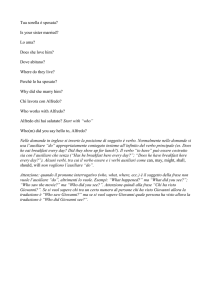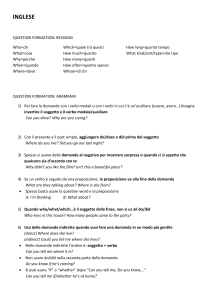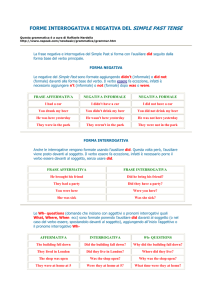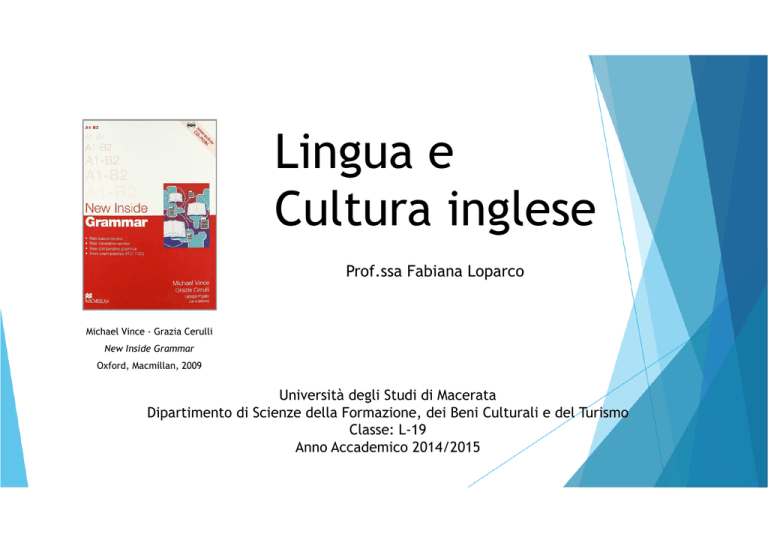
Lingua e
Cultura inglese
Prof.ssa Fabiana Loparco
Michael Vince - Grazia Cerulli
New Inside Grammar
Oxford, Macmillan, 2009
Università degli Studi di Macerata
Dipartimento di Scienze della Formazione, dei Beni Culturali e del Turismo
Classe: L-19
Anno Accademico 2014/2015
Lesson number: 2
1. Il passato semplice/The past simple
2. Il passato progressivo/The past continuous
3. See, hear, feel
4. Used to
5. Alcuni connettivi di tempo/Time linkers
1. Il passato semplice/The simple past
Per ottenere il passato dei verbi si aggiunge –ed alla forma base del verbo
Forma affermativa
Forma interrogativa
Forma negativa
I walked
Did I walk?
I didn’t walk
You walked
Did you walk?
You didn’t walk
He/she/it walked
Did he/she/it walk?
He/she/it didn’t walk
We walked
Did we walk?
We didn’t walk
You walked
Did you walk?
You didn’t walk
They walked
Did they walk?
They didn’t walk
• Le forme interrogative e negative richiedono l’uso dell’ausiliare did.
• L’ausiliare did non si usa se la frase interrogativa inizia con un pronome interrogativo soggetto.
Who wanted to see the film?
Si usa comunque l’ausiliare did se la frase è negativa. Es.: Who didn’t want to see the film?
• L’ausiliare did è di norma usato anche per costruire le forme interrogative e negative del verbo to
have. Es.: Did he have a car? No, he didn’t.
I didnd’t have an umbrella.
Variazioni ortografiche verbi regolari
- Si aggiunge solo –d se il verbo termina in –e:
live – lived; die - died; free - freed
– La –y preceduta da consonante diventa –i:
study – studied; carry – carried; cry – cried
- La –y non muta, però, se preceduta da vocale:
stay – stayed; play – played
- Monosillabi e bisillabi con accento sull’ultima sillaba raddoppiano la consonate finale quando è preceduta
da una sola vocale:
stop – stopped; plan – planned; prefer – preferred
- Verbi terminanti in –l preceduta da una sola vocale raddoppiano la –l in inglese britannico:
travel – travelled; rebel – rebelled; in inglese americano raddoppiano la –l solo se l’accento
cade sull’ultima sillaba: rebelled, traveled
- Verbi in –ic aggiungono una –k:
picnic - picnicked
Un certo numero di verbi ha una forma propria per il passato semplice e per il participio passato
Forma base
Passato semplice
Participio passato
be
was/were
been
come
came
come
go
went
gone
give
gave
given
have
had
had
know
knew
known
read
read
read
see
saw
seen
L’elenco dei verbi irregolari può essere consultato a pp. 496-498 di New Inside Grammar o sul sito
http://www.corsi-di-inglese.eu/verbi-irregolari/elenco-verbi-irregolari-inglesi.php
Exercises
Inserisci i verbi al Simple Past
• William (visit) ___________________ his grandparents last weekend.
•
Jane (arrive) ___________________ an hour ago.
• We (go) ___________________ to Bob's birthday party yesterday.
• I (be) ___________________ on holiday last week.
• She (see) ___________________ fire.
Exercises
Inserisci i verbi al Simple Past
• William visited his grandparents last weekend. |verbo regolare → aggiungiamo ed
• Jane arrived an hour ago. |verbo regolare che termina in e → aggiungiamo una d
• We went to Bob's birthday party yesterday. |verbo irregolare, 2. forma del verbo (go-wentgone)
• I was on holiday last week. |verbo irregolare, 2. forma del verbo (be-was/were-been)|con
I/he/she/it utilizziamo was
• She saw fire. |verbo irregolare, 2. forma del verbo (see-saw-seen)
Exercises
Completa le frasi utilizzando la forma negativa.
• I phoned Lucy last night. → I _____________________ Lucy last night.
• You tidied up your room. → You _____________________ up your room.
• Olivia became an actress. → Olivia _____________________ an actress.
• We found the treasure. → We _____________________ the treasure.
• He spoke Spanish. → He _____________________ Spanish.
Exercises
Completa le frasi utilizzando la forma negativa.
• I phoned Lucy last night. → I didn’t phone Lucy last night.
• You tidied up your room. → You didn’t tidy up your room.
• Olivia became an actress. → Olivia didn’t become an actress.
• We found the treasure. → We didn’t find the treasure.
• He spoke Spanish. → He didn’t speak Spanish.
Exercises
Forma delle domande.
• (you/dance) _________________________________ at the party last night?
• (she/do) ______________________________________ her homework?
• (Robert/work)___________________________________ at the post office?
• (they/help) _______________________________ you with the washing-up?
• When (I/say) ______________________________________ that?
Exercises
Forma delle domande.
• (you/dance) Did you dance at the party last night?
• (she/do) Did she do her homework?
• (Robert/work) Did Robert work at the post office?
• (they/help) Did they help you with the washing-up?
• When (I/say) did I say that?
2. Il passato progressivo/the past continuous
Il passato progressivo si forma con il passato di to be + forma in –ing del verbo:
Forma affermativa
Forma interrogativa
Forma negativa
I was working
Was I working?
I was not/wasn’t working
You were working
Were you working?
You were not/weren’t working
He/she/it was working
Was he/she/it working?
He/she/it was not/wasn’t
working
We were working
Were we working?
We were not/weren’t working
You were working
Were you working?
You were not/weren’t working
They were working
Were they working?
They were not/weren’t working
Il passato progressivo si usa:
Per descrivere un’azione che era in corso di
svolgimento in un momento del passato a cui si fa At 8 o’clock we were having dinner
riferimento
Per descrivere un’azione che era in corso di I was playing the piano when I heard an explosion
svolgimento quando un certo evento del passato si
While I was playing the piano I heard an explosion
è verificato
In narrazioni per descrivere una scena
It was the middle of September but it was still
quite warm. The sun was shining and there were
people lying on the beach. A few boys were
swimming and a little girl was building a sand
castle.
Due azioni di una certa durata possono essere While Sue was peeling the potatoes, her husband
entrambe in corso di svolgimento in un dato was cutting up the onions.
momento del passato
Exercises
Ieri alle nove queste persone stavano svolgendo un azione. Cosa stavano facendo?
Inserisci i verbi nella forma del Past Progressive.
• Richard (work) ______________________ on his computer at 9 o’clock yesterday.
• Lucy and Tom (have) ______________________ dinner.
• I (read) ______________________ an article in the newspaper.
• The children (watch) ______________________ a film on TV at that time.
• Paula (chat) ______________________ on the phone with a friend.
Exercises
Ieri alle nove queste persone stavano svolgendo un azione. Cosa stavano facendo?
Inserisci i verbi nella forma del Past Progressive.
• Richard was working on his computer at 9 o’clock yesterday.
• Lucy and Tom were having dinner.
• I was reading an article in the newspaper.
• The children were watching a film on TV at that time.
• Paula was chatting on the phone with a friend.
Exercises
Inserisci i verbi al Past Progressive.
• When I came into the sitting room, the cats (sit) _____________________ on the table.
• I could tell by his eyes that he (lie) _____________________________ to me.
• We (play) ___________________________ Monopoly when our neighbours rang at the
door.
• Helen (listen) __________________ to the radio when she heard a strange noise in the
garden.
• I (prepare) _______________________________ dinner yesterday when I noticed that the
cooker (work/not) _____________________.
Exercises
Inserisci i verbi al Past Progressive.
• When I came into the sitting room, the cats were sitting on the table.|the cats →
were|Quando una parola contiene una vocale tonica prima della consonante finale si
raddoppia la consonate finale: sit → sitting
• I could tell by his eyes that he was lying to me.|he → was|ie diventa y dopo l'aggiunta di
-ing
• We were playing Monopoly when our neighbours rang at the door.
• Helen was listening to the radio when she heard a strange noise in the garden.
• I was preparing dinner yesterday when I noticed that the cooker wasn’t working.
Exercises
Formula delle domande usando il Past Progressive.
• (what/do/you) __________________________________ yesterday at six?
• (Jane/practise) __________________________________ the piano when you came
home?
• (who/talk/to you) __________________________________ when I saw you last night?
• (what/discuss/they) __________________________________ when she went over to
them?
• (type/she) __________________________________ a message when you interrupted her?
Exercises
Formula delle domande usando il Past Progressive.
• (what/do/you) What were you doing yesterday at six?
• (Jane/practise) Was Jane practising the piano when you came home?
• (who/talk/to you) Who was talking to you when I saw you last night?
• (what/discuss/they) What were they discussing when she went over to them?
• (type/she) Was she typing a message when you interrupted her?
3. See, hear, feel…
I verbi di percezione (see, hear, feel, watch, listen to, notice, observe…) possono essere seguiti dalla
forma base del verbo o dalla forma in -ing
Si usa la forma base quando l’azione è percepita
I saw him get into the car and drive away
dall’inizio alla fine (azione completata).
We were watching the ships moving towards the
Si usa la forma in –ing se l’azione è percepita nel
harbour
corso del suo svolgimento
In alcuni casi entrambe le forme sono corrette e la
scelta dipende da come si percepisce l’azione
I heard a door bang (suono isolato)
I heard a door banging (suono continuo o ripetuto)
Il complemento oggetto va di norma espresso. Nel He heard somebody shout
caso non sia determinato si usa un indefinito
4. Used to
Le forme used to – didn’t use to – did you use to? sono usate per mettere in evidenza che certe
azioni o situazioni erano abituali nel passato e che sono mutate nel presente. Il passato semplice
può comunque essere usato
This café used to be very popular once. A lot of artists used to meet here
This café was very popular once. A lot of artists met here
Nota: non esiste una forma corrispondente per il presente. Per enfatizzare un’abitudine nel presente si
dovrà usare un avverbio:
We always/usually/often meet at the same café
Would può anche essere usato per esprimere azioni abituali nel passato. Would è usato per lo più nel
narrare e non può comunque essere usato per parlare di uno stato:
I used to have a parrot when I was child. When I got home he would/used to fly onto my
shoulder and say “Hello, Nick”
Used to o be/get used to
Used to non va confuso con be/get used to che significano “essere abituati a”/“abituarsi a”.
Be/get used to sono seguiti dalla forma in –ing o da un sostantivo o pronome e possono riferirsi
sia al passato, sia al presente sia al futuro
I bought contact lenses because I thought they were more convenient than glasses, but I
never got used to wearing them
I’ve been in England for some time, so I’m used to driving on the left
Driving on the left is not very difficult, but it takes some time to get used to it.
Nota: In be/get used to il to è una preposizione (non la particella infinitiva), per questo è
seguita dalla forma in –ing. Per capire se il to è preposizione o particella infinitiva basta vedere
se può essere seguito da un sostantivo o un pronome, oltre che da un verbo, come ad esempio in
be accustomed to
I’m not accustomed to eating raw fish
I’m not accustomed to raw fish
5. Time linkers
Alcuni tra i più comuni connettivi di tempo sono: when, while, as, just as, as soon as, the moment
that, meanwhile/in the meantime, after a while/some time later
Then, afterwards, after that = poi, in seguito We had breakfast. After that/Then/Afterwards we
(after non può essere usato con questo significato) went to the park
non After we went…
Finally/eventually = alla fine, dopo un bel po’ di We were uncertain but we eventually/finally
tempo (= in the end)
decided to sell our flat
I’m so pleased Janet has finally/at last passed her
Finally, ma non eventually, in genere esprime un
driving test
certo senso di sollievo, perciò può essere sinonimo
di at last (= finalmente). Può significare, inoltre,
…and finally a few words about…
“per concludere”, “come ultima cosa”
On + forma in –ing è una forma usata per esprimere
“nel momento in cui”
On hearing the news, he became pale
On entering the house, he smelt gas
Per approfondire ed esercitarsi:
New Inside Grammar
Lesson & excercises
pp. 96-112; 349-350
English Children’s
Literature
Winnie the Pooh
Author: Alan Alexander Milne
Publication date: October 14, 1926

